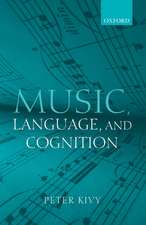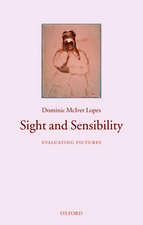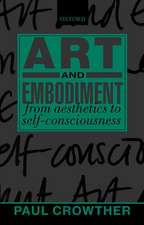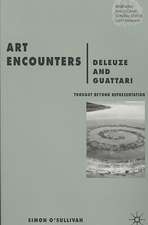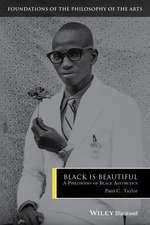Why Are We Attracted to Sad Music?
Autor Sandra Garridoen Limba Engleză Hardback – 15 dec 2016
| Toate formatele și edițiile | Preț | Express |
|---|---|---|
| Paperback (1) | 581.14 lei 6-8 săpt. | |
| Springer International Publishing – 7 iul 2018 | 581.14 lei 6-8 săpt. | |
| Hardback (1) | 586.88 lei 6-8 săpt. | |
| Springer International Publishing – 15 dec 2016 | 586.88 lei 6-8 săpt. |
Preț: 586.88 lei
Preț vechi: 690.45 lei
-15% Nou
Puncte Express: 880
Preț estimativ în valută:
112.30€ • 117.25$ • 92.94£
112.30€ • 117.25$ • 92.94£
Carte tipărită la comandă
Livrare economică 05-19 aprilie
Preluare comenzi: 021 569.72.76
Specificații
ISBN-13: 9783319396651
ISBN-10: 331939665X
Pagini: 214
Ilustrații: IX, 270 p.
Dimensiuni: 148 x 210 x 20 mm
Greutate: 0.5 kg
Ediția:1st ed. 2017
Editura: Springer International Publishing
Colecția Palgrave Macmillan
Locul publicării:Cham, Switzerland
ISBN-10: 331939665X
Pagini: 214
Ilustrații: IX, 270 p.
Dimensiuni: 148 x 210 x 20 mm
Greutate: 0.5 kg
Ediția:1st ed. 2017
Editura: Springer International Publishing
Colecția Palgrave Macmillan
Locul publicării:Cham, Switzerland
Cuprins
1. Chapter 1 – Introduction.- 2. Chapter 2 – What Is Sad Music?.- 3. Chapter 3 – The Philosophical Debate.- 4. Chapter 4 – Physiological Effects of Sad Music.- 5. Chapter 5 – A Historical Overview of Music and Mood Regulation.- 6. Chapter 6 – The Role of Sad Music in Mood Regulation.- 7. Chapter 7 – Individual Differences in the Attraction to Sad Music.- 8. Chapter 8 – Mood Regulation Disorders: An Exception to Mood Management Theory?.- 9. Chapter 9 – Musical Prescriptions: Do They Work.- 10. Chapter 10 – Listening Context: Group Rumination and Emotional Contagion.- 11. Chapter 11 – Nostalgia and Mixed Emotions in Response to Music.- 12. Chapter 12 – The Addiction of Love: Sad Music and Heartbreak.- 13. Chapter 13 – The Role of Sad Music in Grief.- 14. Chapter 14 – Towards a Model for Understanding Sad Music Listening.- References.
Recenzii
“Garrido has written a book that is interesting and provides the reader with numerous studies that discuss attraction to sad music. The book is a valuable resource in the study of psychology, especially when a person is suffering from depression. The insight provided in regards to the link between listening to sad music, depression, nostalgia and rumination is fascinating.” (Hennie Weiss, metapsychology online reviews, metapsychology.mentalhelp.net, Vol. 21 (38), September, 2017)
“Why Are We Attracted to Sad Music? is fresh, erudite, and exhaustively researched. A great strength of the work is its breadth of scholarship. … In addition to psychologists, the book will also be of interest to emotion researchers, philosophers of aesthetics, and musicologists. … In summary, Garrido offers an expansive, exhaustively researched dissertation on sad music acrossa range of disparate literatures.” (J. Ian Norris, PsycCRITIQUES, Vol. 62 (22), May, 2017) Notă biografică
Dr. Sandra Garrido is a researcher in music psychology, a pianist and violinist, and the mother of two small boys. After completing her PhD at the University of New South Wales, Australia, she spent several years in research at the Melbourne Conservatorium of Music and the Australian Research Council’s Centre of Excellence for the History of Emotions. She is currently a Dementia Research Fellow at the MARCS institute for Brain, Behaviour and Development at Western Sydney University. She has authored over 30 academic publications and co-authored a book entitled My Life As A Playlist (2014).
Textul de pe ultima copertă
In this book, perspectives in psychology, aesthetics, history and philosophy are drawn upon to survey the value given to sad music by human societies throughout history and today. Why do we love listening to music that makes us cry? This mystery has puzzled philosophers for centuries and tends to defy traditional models of emotions. Sandra Garrido presents empirical research that illuminates the psychological and contextual variables that influence our experience of sad music, its impact on our mood and mental health, and its usefulness in coping with heartbreak and grief. By means of real-life examples, this book uses applied music psychology to demonstrate the implications of recent research for the use of music in health-care and for wellbeing in everyday life.
Caracteristici
Universal subject-matter with implications for scholars in philosophy, psychology, music and healthcare Heavily based on recent studies undertaken in the field of health by the author Empirical approach to an expansive subject which has been covered by a lot of literature






